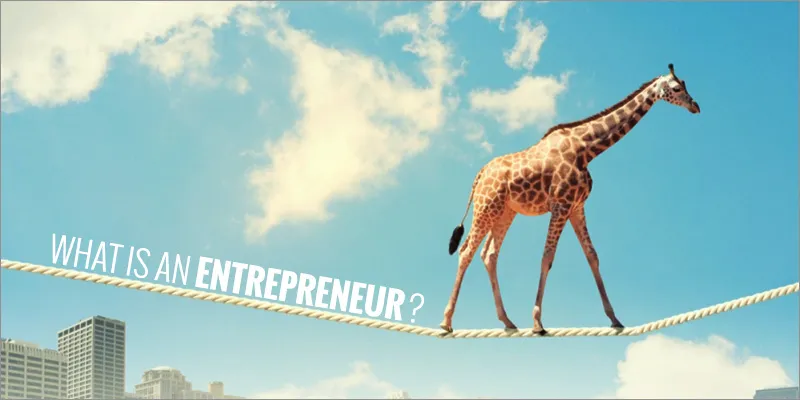Saving entrepreneurship from entrepreneurs

Gatsby believed in the green light, the orgiastic future that year by year recedes before us. It eluded us then, but that’s no matter—tomorrow we will run faster, stretch out our arms farther. And then one fine morning—
So we beat on, boats against the current, borne back ceaselessly into the past.
- F. Scott Fitzgerald (The Great Gatsby)
We live in strange times. Success is believed to be earned. Luck plays a small role. Economic justice exists. We triumph because we are smarter and more hardworking than those who aren’t. Social conditions have very little to do with it. Rarely do we pause to think that with the same individual talent, success might come easier to a middle class person living in Singapore than to one in Ethiopia
The crisis, however, is not with those who succeed. It is with those who fail. When meritocracy is misplaced, poverty is not just seen as regrettable, but also deserved.
In Abhishek Majumdar’s recent play Thook, he explores the problem of hunger in India. The striking aspect of his approach towards the protagonist going hungry is not the sorrow associated with his empty stomach, but the humiliation he faces (hence the name 'thook', meaning spit; and not 'bhookh', meaning hunger.) "Kaise insaan ho tum? Apna pet bhi nahi bhar sakte?," is the question he battles with.
We live in the shadow of the American Dream. We like to believe that everyone has equal opportunities. The poor is not poor, but someone waiting to get rich. It's one big party to which they haven’t been invited, yet. However, if only they work hard enough, they'll soon be a part of it. Success is everything. While such meritocratic approach accelerates individual talent and economic growth, it burdens the failed individual with overwhelming amounts of guilt and stress which our species is not accustomed to handle.
Associating failure with the individual is a relatively new idea. For a very long time, despair was an outcome of one's deeds of the previous life, or the social strata one was born into. With the advance of modernity, we have overcome most evils of the medieval age, but have given birth to newer problems. As Hegel (and later Marx) advocated, any substantial historic change is dialectic, or a three step process - thesis, antithesis and synthesis. Each problem, when overcome, comes up with newer problems. It is the negation of negation that matters.
Yeah, we failed... so what?

A lot of startups fail. However, unlike a few decades ago, we don't seem to mind new businesses failing. Thanks to the few which succeed, the show goes on. Taleb rightly argues that entrepreneurs who fail should be treated like medieval heroes who sacrifice for the greater good. YourStory's popular series on celebrating failure is also a testament to this phenomenon.Meritocracy is a modern phenomenon. Entrepreneurs who fail when dealt with compassion and even admiration helps bring sanity to the construct of failure in our culture. But probably even such embellishment is overkill. No matter how we try to fabricate these stories of failure, most entrepreneurs will agree that failure sucks.
Unlike the early days when most businesses were built with money borrowed from a relative or friend, we live in times when new companies receive investment from markets. Markets are brutal. Quite a few millennials deal with their fear of failure with arrogance; Steve Jobs being their role model. This pretension, often fuelled by money raised from the market, is driven by similar emotions which drive self-humiliation in the poor hungry man. Rarely do they realize that Steve Jobs did not borrow people’s money.
Secondly, when we celebrate failure of an individual's idea, we tend to ignore the material failure of his workers. The entrepreneur, being more resourceful (and sometimes, more skilled), may as well go on to start a new company, but those who lose jobs take the greater hit. Even if one idea of a business fails, the entrepreneur can always take an opportunistic drift. Coca-Cola began as a pharmaceutical product. Nokia began as a paper mill. Wipro was initially set up as a manufacturer of vegetable and refined oils. Ideas are agile. People aren't. We rarely ask "what happened to the paper mill worker after Nokia failed?"
This was precisely the point of difference between Hegel's idealism and Marx's materialism. Hegel said that ideas give birth to more ideas, while Marx claimed that material, and not ideas, give birth to newer ideas. Ideas are made possible only when allowed by the social and material conditions of the time and place. In less abstract terms, Hegel advocated that money gives birth to more money, while Marx claimed that labour gives birth to more money.
The debate between idealism and materialism is an on-going one. However, in case of a failed startup, the workers undergo material loss, while the entrepreneur undergoes an idealistic loss. In most cases, especially in the digital era, not much is at risk for the entrepreneur as we like to believe and celebrate.
Risk is not so risky

We love to believe that entrepreneurs take great risks. We like to compare entrepreneurs with a medieval warrior and celebrate his failure. However, we silently avoid comparing him with an artist or an artisan for whom there is great downside and little upside.Advances in technology and communication have made it easier to start up with a laptop, internet connection, a good idea, ample amount of time, and loads of enthusiasm. If an entrepreneur fails, he starts again. Not much is lost.
With economic fluctuations, which lead to redundancies and frequent layoffs in large unstable corporations, more and more college graduates are willing to become entrepreneurs. There is ample government support to help them. Universities have dedicated incubation centres. A daytime job in a corporate has equal risks but greater uncertainty than becoming an entrepreneur. Becoming an entrepreneur is not as risky as it was a few decades ago.
When success and failure is the same thing
Both success and failure are scary and hard to handle for someone dealing with the process and not immediate results. Both being mainstream rhetoric, do not mean much in the larger picture. Rags to riches stories sound good, but there is always the larger set of social values and rules at play, or as Lacan would say, the ‘big other’ is omnipresent. While for the existential entrepreneur, the philosopher king, success and failure rarely matter, so should be for the worker whose material well-being is at stake.
We live in strange times. Failure either leads to humiliation or celebration, but very little introspection. Success comes with its own guilt and set of responsibilities. There is too much dialogue around success and failure, and too little on utilitarian maximization, and individual well-being. The vital few have started to outnumber the trivial many. Too much optimism is probably what we suffer from.
From Socrates to Žižek, the great responsibility of philosophy has been to burst the bubble of excessive optimism. On Wittgenstein's birthday, his landlady exclaimed, “Many happy returns!” “No there aren’t,” he sighed. He was dying of cancer.
References –
- Slavoj Žižek, 1989, The Sublime Object of Ideology, Verso Books
- Michael Young, 1958, The Rise of the Meritocrac, Transaction Publishers
Image Credit : Shutterstock
Related Essays –
What a piece of work is a man!
Following your passion and other absurd ideas
What if Gregor Samsa was an entrepreneur?
In defence of consumerism, the other one







